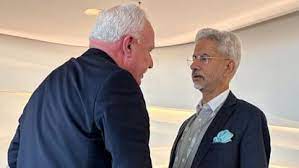NEW DELHI: External Affairs Minister S Jaishankar met his Armenian and Palestinian counterparts on the sidelines of the Munich Security Conference on Sunday.
“Very pleased to meet Ararat Mirzoyan,” Jaishankar posted on X. The meeting comes at a time when Armenia has said it fears a full-scale war from Azerbaijan and is looking to diversify its defence ties with focus on India where it recently appointed a defence attaché.
“Look forward to taking our partnership further. Nice to see Palestinian Foreign Minister Riyad al-Maliki. Exchanged views on the current situation in Gaza,” posted Jaishankar on X of his meeting with the Palestinian Foreign Minister. He also met German Foreign and Security Policy Adviser Jens Plotner.
Armenia has already purchased rocket launchers, phased array radars and ammunition from India and there is talk of a defence agreement to streamline the security relationship. India and Armenia had inked a $250 million Pinaka deal and a $40 million contract for four Swathi weapon-locating radars. In an indication where its sympathy lay, India had condemned Azerbaijan’s “aggression” towards Armenia.
India and Armenia have also held trilateral consultations with Iran last year where they discussed the participation in the International North-South Transport Corridor.
Speaking at the Munich Security Conference, the External Affairs Minister said Israel should have been “very mindful” of civilian casualties.
“Number one, we must be clear that what happened on October 7 was terrorism. No caveats, no justification, no explanation. It was terrorism. Number two, as Israel responds, it is important that Israel should be and should have been very mindful of civilian casualties,” he observed.
Jaishankar said, “Number three, the return of hostages is imperative. Number four, there is a need for a humanitarian corridor, a sustainable humanitarian corridor to provide relief. And eventually, there has to be a permanent fix, a long-term fix, otherwise, we’re going to see a recurrence.”
“I think a very large number of countries, especially those in the Global South, believe that terrorism shouldn’t be countenanced or justified. But they equally strongly believe that a two-state solution should not be delayed,” he said.


